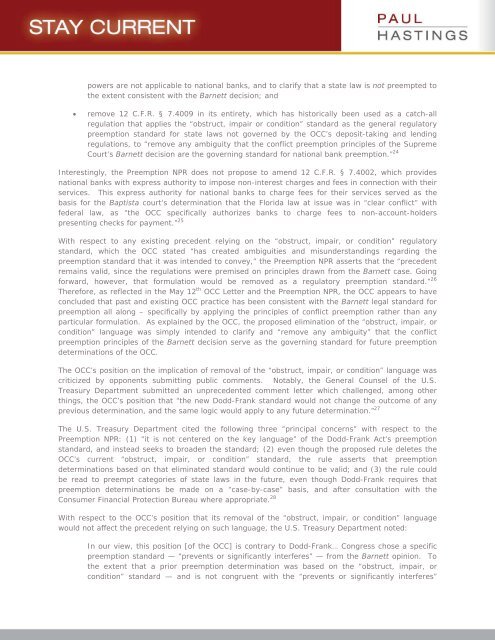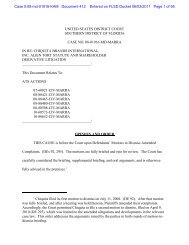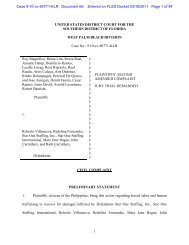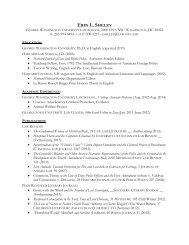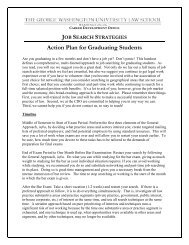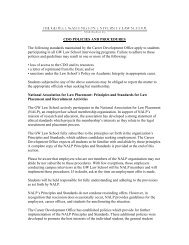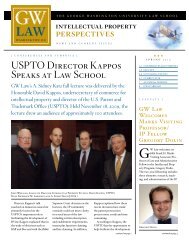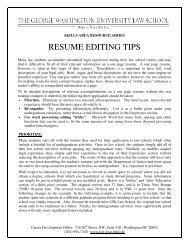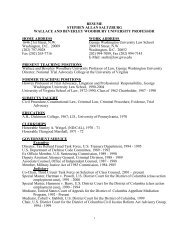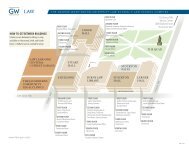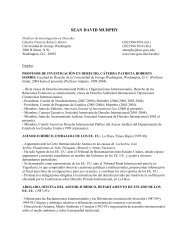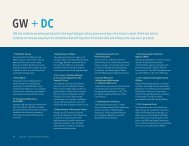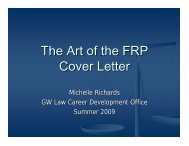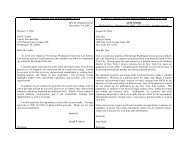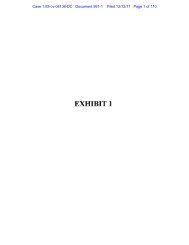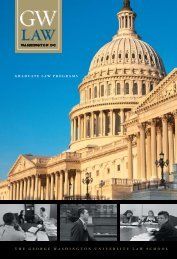CLE Materials for Panel #1 - George Washington University Law ...
CLE Materials for Panel #1 - George Washington University Law ...
CLE Materials for Panel #1 - George Washington University Law ...
Create successful ePaper yourself
Turn your PDF publications into a flip-book with our unique Google optimized e-Paper software.
powers are not applicable to national banks, and to clarify that a state law is not preempted to<br />
the extent consistent with the Barnett decision; and<br />
<br />
remove 12 C.F.R. § 7.4009 in its entirety, which has historically been used as a catch-all<br />
regulation that applies the “obstruct, impair or condition” standard as the general regulatory<br />
preemption standard <strong>for</strong> state laws not governed by the OCC’s deposit-taking and lending<br />
regulations, to “remove any ambiguity that the conflict preemption principles of the Supreme<br />
Court’s Barnett decision are the governing standard <strong>for</strong> national bank preemption.” 24<br />
Interestingly, the Preemption NPR does not propose to amend 12 C.F.R. § 7.4002, which provides<br />
national banks with express authority to impose non-interest charges and fees in connection with their<br />
services. This express authority <strong>for</strong> national banks to charge fees <strong>for</strong> their services served as the<br />
basis <strong>for</strong> the Baptista court’s determination that the Florida law at issue was in “clear conflict” with<br />
federal law, as “the OCC specifically authorizes banks to charge fees to non-account-holders<br />
presenting checks <strong>for</strong> payment.” 25<br />
With respect to any existing precedent relying on the “obstruct, impair, or condition” regulatory<br />
standard, which the OCC stated “has created ambiguities and misunderstandings regarding the<br />
preemption standard that it was intended to convey,” the Preemption NPR asserts that the “precedent<br />
remains valid, since the regulations were premised on principles drawn from the Barnett case. Going<br />
<strong>for</strong>ward, however, that <strong>for</strong>mulation would be removed as a regulatory preemption standard.” 26<br />
There<strong>for</strong>e, as reflected in the May 12 th OCC Letter and the Preemption NPR, the OCC appears to have<br />
concluded that past and existing OCC practice has been consistent with the Barnett legal standard <strong>for</strong><br />
preemption all along – specifically by applying the principles of conflict preemption rather than any<br />
particular <strong>for</strong>mulation. As explained by the OCC, the proposed elimination of the “obstruct, impair, or<br />
condition” language was simply intended to clarify and “remove any ambiguity” that the conflict<br />
preemption principles of the Barnett decision serve as the governing standard <strong>for</strong> future preemption<br />
determinations of the OCC.<br />
The OCC’s position on the implication of removal of the “obstruct, impair, or condition” language was<br />
criticized by opponents submitting public comments. Notably, the General Counsel of the U.S.<br />
Treasury Department submitted an unprecedented comment letter which challenged, among other<br />
things, the OCC’s position that “the new Dodd-Frank standard would not change the outcome of any<br />
previous determination, and the same logic would apply to any future determination.” 27<br />
The U.S. Treasury Department cited the following three “principal concerns” with respect to the<br />
Preemption NPR: (1) “it is not centered on the key language” of the Dodd-Frank Act’s preemption<br />
standard, and instead seeks to broaden the standard; (2) even though the proposed rule deletes the<br />
OCC’s current “obstruct, impair, or condition” standard, the rule asserts that preemption<br />
determinations based on that eliminated standard would continue to be valid; and (3) the rule could<br />
be read to preempt categories of state laws in the future, even though Dodd-Frank requires that<br />
preemption determinations be made on a “case-by-case” basis, and after consultation with the<br />
Consumer Financial Protection Bureau where appropriate. 28<br />
With respect to the OCC’s position that its removal of the “obstruct, impair, or condition” language<br />
would not affect the precedent relying on such language, the U.S. Treasury Department noted:<br />
In our view, this position [of the OCC] is contrary to Dodd-Frank… Congress chose a specific<br />
preemption standard — “prevents or significantly interferes” — from the Barnett opinion. To<br />
the extent that a prior preemption determination was based on the “obstruct, impair, or<br />
condition” standard — and is not congruent with the “prevents or significantly interferes”<br />
4<br />
4


